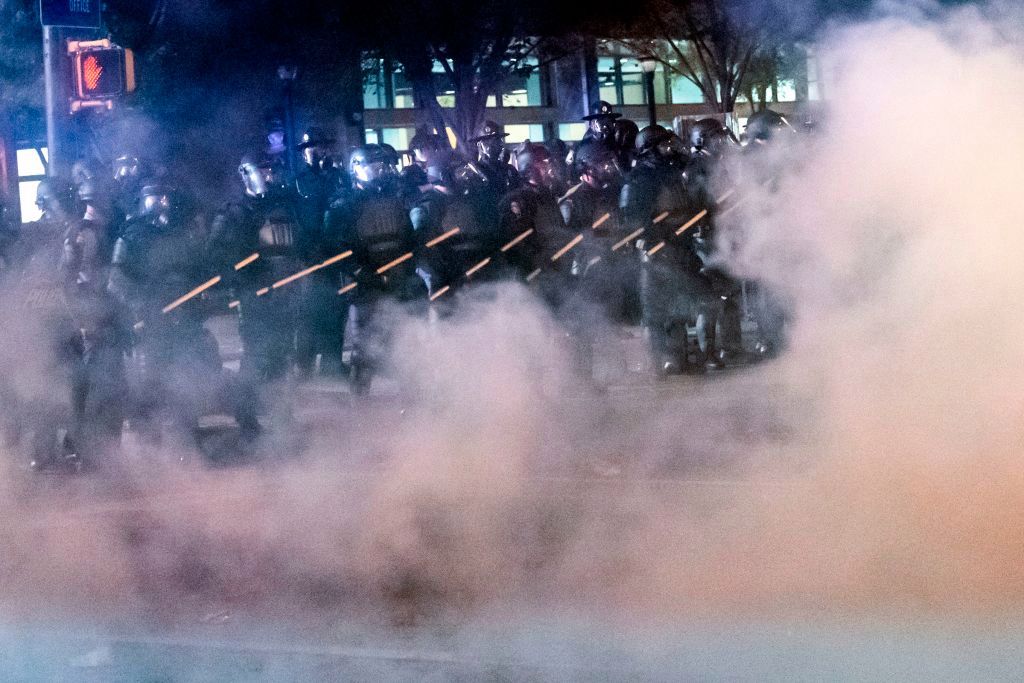The ‘Mecca’ Is A Mirage: Police Brutality Shows Atlanta Is A Tale Of Two Cities For Black People
Source: Elijah Nouvelage / Getty
Another police brutality incident put Atlanta back in the law enforcement spotlight, with some questioning the city’s status as a hub for Black people. Atlanta-based attorney Tiffany Williams Roberts tore into the city’s image as a place for Black people to thrive, suggesting it is a tale of two cities: The best of times and the worst of times.
“Atlanta is not a Mecca when it comes to the impact of the violent police state,” tweeted Roberts. “We are part of the problem. Period.”
Blood on their hands, literally. Faces of all parties are obscured to protect my client, who has since moved on with his life. The point is, Atlanta is not a Mecca when it comes to the impact of the violent police state. We are part of the problem. Period. pic.twitter.com/9O9gbRiCEs
— Tiff Roberts (@shedefendsit) July 27, 2021
A civil rights and criminal defense attorney, Roberts shared the story of her first client on Twitter. In her thread, Roberts detailed handling the abuse and arrest only to find out later the arresting officer had let his certification lapse.
As one of several metro Atlanta area attorneys who has handled police brutality cases, Roberts is quite familiar with the complexity of Atlanta. In her current capacity as community engagement and movement counsel for the Southern Center for Human Rights, Roberts is a part of a team committed to alleviating the burden of injustice on disenfranchised communities.
The pinned post on her personal Twitter account is a reminder of one of the many Black lives lost at the hands of an Atlanta police officer.
#OscarCain was our baby. We met 7 or 8 years ago when we had our little scrappy police accountability group, BLOCS. He was generous and caring. He was funny and sincere. He loved to make music. Sunday, he was taken from us by an Atlanta Police Officer. How many more, Atlanta? https://t.co/fm2n9Iq9Bc
— Tiff Roberts (@shedefendsit) April 5, 2019
Even as all eyes were watching the streets in the wake of 2020 racial justice protests, Atlanta police officers killed Rayshard Brooks and brutalized two HBCU students on live television. Countless others were detained or arrested during protests, with questions raised about the use of force in the department’s response last summer.
Some of the previously fired officers were subsequently reinstated due to an independent board finding procedural issues in their dismissal. And even as cities like Atlanta grapple with a reported rise in crime, elected officials cannot turn a blind eye to the other issues affecting residents.
PS: Atlanta is not some magical city named Wakanda. Real people live here. The dehumanizing inequality, poverty and police brutality is REAL.
— Rev. James Woodall (@iMajorWish) June 13, 2020
A June 2020 report showed that Atlanta continued to lead in economic inequality and stagnant economic mobility. Atlanta Business Chronicle reported an approximately $55,000 difference between Black and white family household income despite the city’s Black political class and entertainment elite.
Unfortunately, this is not new. Where there has been opportunity for some, Atlanta has acted violently towards low-income Black communities. A look at the lead-up to the 1996 Olympics hosted in Atlanta and its aftermath is a reminder of how Atlanta has failed a cross-section of Black Atlantans.
From the replacement of Techwood Homes and displacement of Black families to the building of the Atlanta Detention Center downtown, Atlanta’s elite have a history of disappearing the “undesirables” to create a southern Oasis.
Reminder that the Olympics are structurally evil for many reasons, one of which is they RELY ON the policing & removal of disproportionately Black poor, sex-working & homeless people. The Atlanta jail was built for the 1996 Olympics––a jail we’re still organizing to close in 2021
— micah #StopCopCity (@micahherskind) July 28, 2021
And even as cities like Atlanta try to grapple with alleged surges in crime and uneven economic rebound, there continues to be a lack of investment in the same communities that are over-policed. It’s not enough to proclaim the city’s greatness and project an aspirational vision.
Atlanta has seen decades of Black mayors, Black district attorneys, a Black president, and now Black vice president and the current mayor’s named Keisha. However, many Black people are still being pushed to the margins and priced out of neighborhoods they’ve long resided in.
While Atlanta is not unique, it is the pretense of success that hides deep inequities. In reality, there are two Atlantas; the mecca and the mirage.
SEE ALSO:
Video Shows Atlanta Cop Kicking Woman In The Face As Partner Stands And Watches
Black Woman Shot In The Leg After She Refused A Man’s Advances In Atlanta
[ione_media_gallery id=”4165055″ overlay=”true”]

